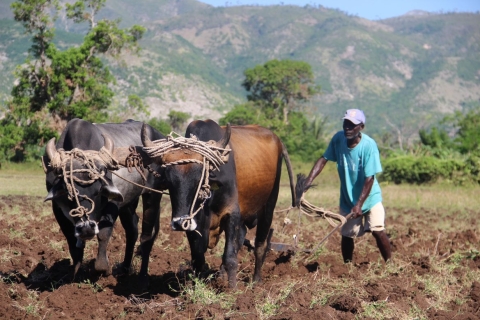
Maryknoll Office for Global Concerns joined a group of twenty organizations in writing to Congress on the unprecedented levels of acute hunger in the island nation of Haiti due to increased costs of imports, drought, and government neglect of agriculture. U.S. assistance, from the Farm Bill and USAID, should go to existing local and small-scale farms and agricultural organizations to promote food sovereignty over food dependence. Read the letter as a PDF.
September 18, 2023
Dear Members of Congress:
As organizations from the U.S. and Haiti, we write to ask you to support efforts by local Haitian farmers to respond to unprecedented hunger in their country. More than half of all Haitians face acute hunger as a result of high imported food costs, a decade of drought, and government neglect of agriculture.
As Congress debates a new Farm Bill, and annual appropriations for USAID, which include tens of millions of dollars in emergency funding to Haiti, you have a long overdue opportunity to realign U.S. agricultural assistance to Haiti with the urgent needs of local Haitian farmers, so they can play a leading role response to hunger in Haiti.
Since 2010, only 3.1 percent of the $383 million USAID has spent on agriculture Haiti has gone to local Haitian organizations. Moreover, the focus of USAID programming in Haiti does not match the priorities of Haitian farmers. Whereas USAID is focused on market system reform, local Haitian farmers are asking for help with irrigation, higher quality seeds, better tools, land rights, and support from agronomists to adapt their crops to drought conditions.
GAO’s March 2023 report on USAID activities in Haiti found that, “USAID/Haiti does not have a process to accurately track and analyze data on its partnerships with local organizations. Nor does it know the full scope or effectiveness of activities …to help build local partner capacity.” These findings reflect a deep disconnect between USAID’s Haiti Mission and the leading Haitian peasant and agricultural organizations.
In order to make U.S. aid to Haiti more effective and sustainably reduce hunger, we ask you to use your appropriations, oversight, and legislative authority to support the following changes in U.S. agriculture policy in Haiti.
-
Direct USAID to change its agricultural policy in Haiti from market system reform to support for small-scale farmers to adapt to drought and climate change. This should include focusing agricultural investments on the inputs local farmers need, including irrigation, seed banks, tool banks, land tenure, better roads to get crops to market, and help from agronomists to adapt crops.
-
Direct USAID to work with local regional government water and agriculture agencies and peasant and community organizations to develop a comprehensive water management plan to help Haitian farmers and communities adapt to drought and climate change.
-
Increase funding for Haitian-led peasant, farmer, and community-based organizations working to strengthen agriculture, through the Inter-American Foundation (IAF), either through direct appropriations to IAF, or through USAID.
-
Include localization provisions in the Farm Bill, so that 25 percent of U.S. funding for Section 202(b) Resilience Food Security Activities and McGovern-Dole Food for Education is managed by locally-led organizations, and 50 percent of programming places local communities in the lead in setting priorities and designing programs.
-
Direct USAID and USDA to support pilot programs designed for local organizations in Haiti and other countries facing extreme climate change to support locally-led programming by community-based organizations to help small-scale farmers adapt to drought through water management, seed and tool banks, land reform, access to affordable micro-credit, and agronomists.
-
Require that USAID and USDA program design for agricultural activities include consultation with community-based and peasant organizations in targeted areas and that their priorities be included in Requests for Applications.
-
Direct U.S. agencies to maximize the amount of emergency food assistance to Haiti that is purchased locally and reject legislative proposals that would require that nonemergency food aid be spent on U.S. commodities.
The U.S. people need to know that the foreign assistance funding for Haiti is being spent wisely, and is reaching those who need the most help. It makes common sense and it is in the U.S.’s interest to focus on helping Haitians restore their capacity to meet their food needs. With your leadership we can make Haitian food sovereignty a reality.
Sincerely,
Amnesty International USA
Centre d'Agriculture Saint Barnabas Support Group Ltd.
Faith in Action International
Faith in New Jersey
Faith in New York
Franciscan Action Network
Haiti H2O: Hope to Opportunity
Haitian Community Land Trust
Institute for Justice & Democracy in Haiti
Maryknoll Office for Global Concerns
Mennonite Central Committee U.S.
Organisation Peuple Œcuménique pour le Développement du Nord (OPODNO)
Organisation Peuple Œcuménique pour le Développement du Nord-Est (OPODNE)
Passionist Solidarity Network
Passionists International
Presbyterian Church (USA), Office of Public Witness
Quixote Center
Raising Haiti Foundation
Sisters of Mercy of the Americas Justice Team
Unitarian Universalist Service Committee (UUSC)
Photo of Haitian farmer from the World Bank Latin America and Caribbean via Flickr.
